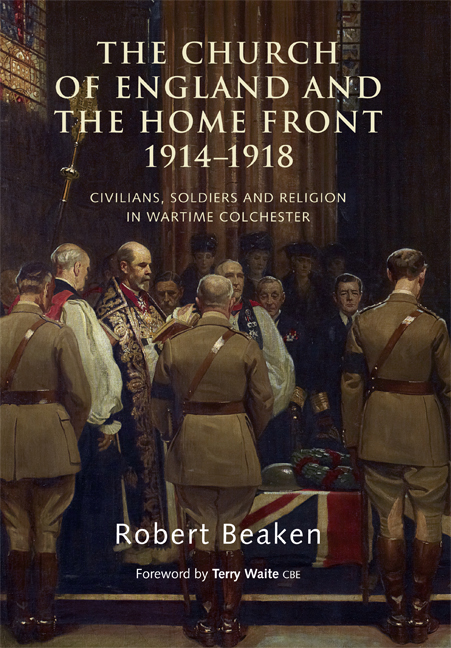 The Church of England and the Home Front, 1914-1918
The Church of England and the Home Front, 1914-1918 Book contents
- Frontmatter
- Dedication
- Contents
- List of Illustrations
- Foreword
- Author’s Acknowledgements
- 1 The First World War – One Hundred Years On
- 2 Colchester
- 3 Wartime
- 4 The Clergy
- 5 The Laity
- 6 Prayer and Worship
- 7 The National Mission of Repentance and Hope
- 8 Thought and Attitudes
- 9 Armistice, Remembrance and Aftermath
- 10 The Church of England and the First World War
- Bibliography
- Index
Foreword
Published online by Cambridge University Press: 11 May 2021
- Frontmatter
- Dedication
- Contents
- List of Illustrations
- Foreword
- Author’s Acknowledgements
- 1 The First World War – One Hundred Years On
- 2 Colchester
- 3 Wartime
- 4 The Clergy
- 5 The Laity
- 6 Prayer and Worship
- 7 The National Mission of Repentance and Hope
- 8 Thought and Attitudes
- 9 Armistice, Remembrance and Aftermath
- 10 The Church of England and the First World War
- Bibliography
- Index
Summary
The late Robert Runcie, one-time archbishop of Canterbury and, incidentally, a distinguished holder of the Military Cross, frequently proclaimed that ‘nothing was real unless it was local’. Mischievously, his private staff requested that he define what he meant by ‘real’, even though they knew full well what he really meant.
In a world where history is too often relegated to a lowly place in the school curriculum, another distinguished scholar, Dr Robert Beaken, has done a distinct service to Colchester in recording the impact of the First World War on that ancient garrison town. He has written a focused and detailed local history which he has placed in its wider context, and his careful research has revealed some fascinating statistics. Who would have thought that the Borough of Colchester Social Club for the Troops, well supported by the Church of St Mary-at-the-Walls, would have distributed eleven tons of cake to hungry troops during the war years? That is indeed a lot of cake!
However, Dr Beaken does not confine his research to statistics. Throughout the centuries, Christians of every persuasion have been divided in their attitude to warfare, and the Church of England, as located in and around Colchester, was no exception. The episcopate urged the clergy to remain in their parishes, in order to give pastoral care to the many hundreds of people who were bereaved or who were suffering from other forms of distress as a result of the war. Understandably, such were the social pressures, and their individual convictions, that not all priests felt able to obey this injunction. Most clergy did, and this book illustrates how the Anglican parishes of Colchester served their community in diverse ways during harsh and difficult years of 1914–18. As might be expected, there are many references to the army, and the interaction between the civilian population and the troops, both positive and negative, is well documented.
There has been much controversy across the years in respect of the Church's attitude to warfare, and in particular concerning the thorny question of the blessing of weapons of war. The author quotes research conducted by the director of the Army Chaplaincy Museum, who has been unable to uncover any such incidents, apart from the naming of an aircraft by an obscure princess in 1918.
- Type
- Chapter
- Information
- The Church of England and the Home Front, 1914-1918Civilians, Soldiers and Religion in Wartime Colchester, pp. xi - xiiPublisher: Boydell & BrewerPrint publication year: 2015


